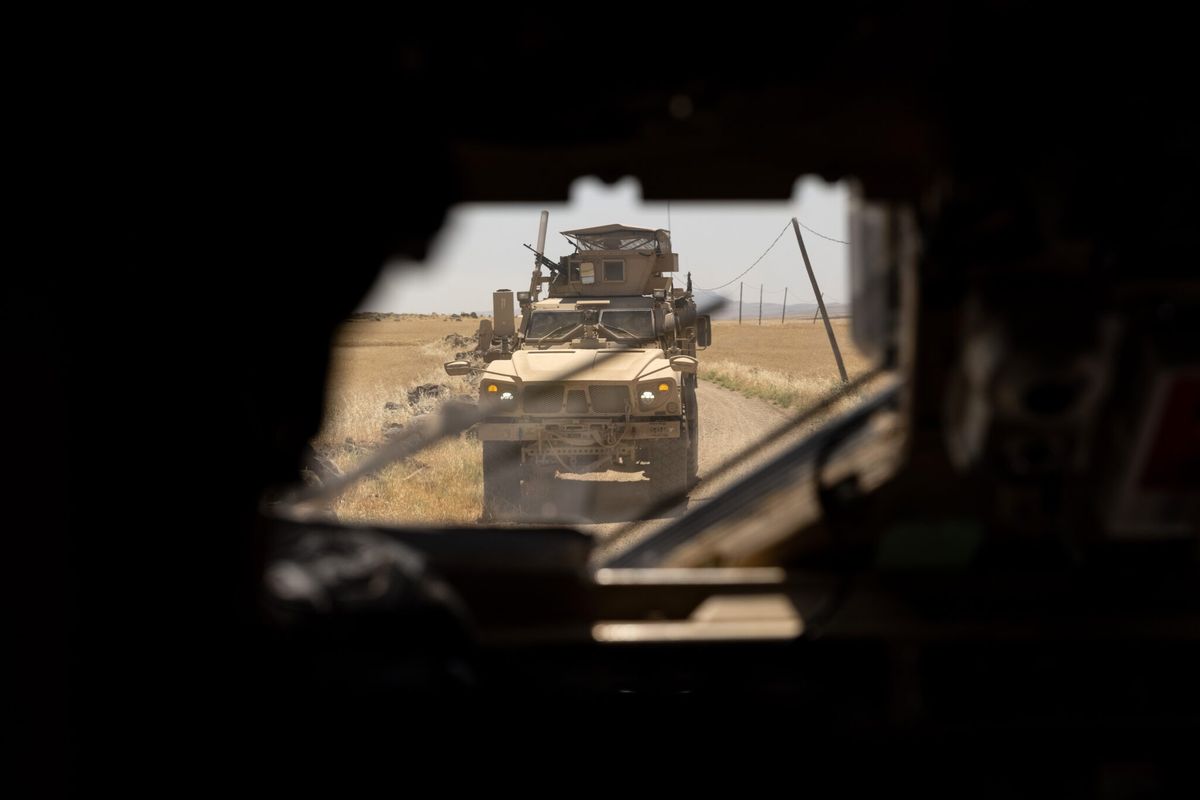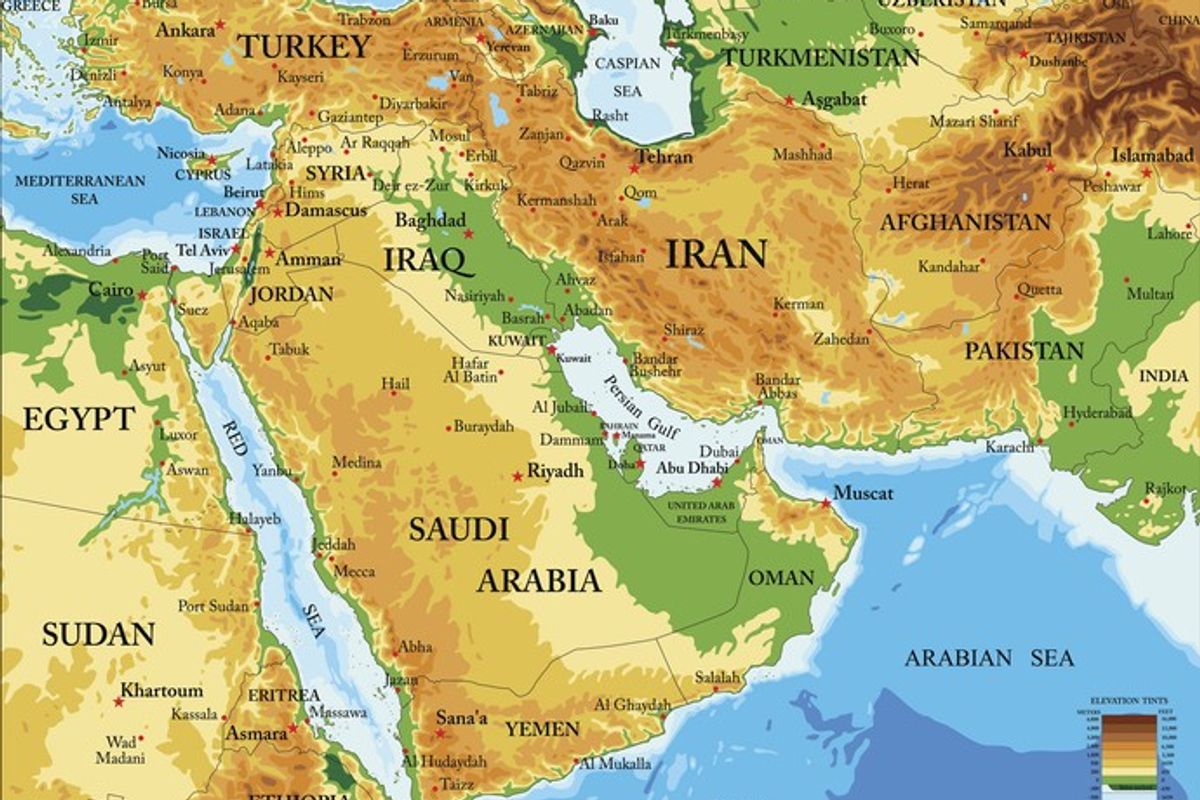This September, voters in the territories controlled by the Kurdistan Regional Government (KRG) of northern Iraq voted overwhelmingly to declare independence from the central government in Baghdad. In response, Iraq, Turkey, and Iran have conducted joint military exercises around the KRG in an unprecedented show of solidarity between three historic rivals. The concept that the KRG might leave Iraq brings up an old argument, most recently popularized by former Vice President Joe Biden, that Iraq is actually three countries now - split between Kurdish, Shi'a, and Sunni populations - and that it should be allowed to split. Monday’s incursion by the Iraqi army into Kurdish-controlled Kirkuk seems to underline this point. The Cipher Brief’s Fritz Lodge spoke with Iraq expert and Soref Fellow at the Washington Institute, Bilal Wahab, about how the chance for peaceful federalism in Iraq has probably already passed.
TCB: Where does the idea to split Iraq into three pieces come from?
Bilal Wahab: The strongest proponent of Iraqi federalism was Joseph Biden when he was a senator, but when he could actually do something about it as Vice President.
The op-ed he published with Leslie Gelb was probably most high-profile argument for, not necessarily partition, but federalism in Iraq and the policy recommendations in that article were advised very heavily by the experience in former Yugoslavia. At the time, when he was in the senate, Biden even convinced the senate to endorse this project.
But then when he became vice president, he tabled this proposal and adopted the mainstream U.S. policy of maintaining the status quo and sanctity of the borders.
The other person who writes about this subject is Peter Galbraith, who also has a Bosnian connection because he was the ambassador to Croatia. He has been very close to the Kurds. He was advising the Kurdish leadership in 2004-05 during the writing of the Iraqi constitution, and continuing to today, he was also an advisor to [KRG President Masoud] Barzani about the referendum.
Basically, his point is that continuing to send money and resources to Iraq in order to keep it united is not in U.S. interests. For him, in particular, the argument seems essentially to be let’s save what can be saved, which is Iraqi Kurdistan. It is already self-governing and a willing American ally.
TCB: Is the idea of federalizing or splitting Iraq along ethno-sectarian lines feasible and sustainable? Do you think Biden changed his mind to believe that this kind of federalization is unfeasible?
Wahab: I’m not sure what changed Biden’s calculus, but the question of stability is a hard one and has several dimensions.
On the one hand, could it work? Economically, I think the KRG could potentially work as a country because it has built institutions, including a security apparatus with police, intelligence, and an effective army in the Peshmerga. And then you have an oil infrastructure that could generate revenue, so these are some of the pillars of statehood.
A Shi’a region – based in the south – also has the pillars of statehood, already centered in Baghdad. But the question is whether you split along ethnic or ethno-sectarian grounds. If it is ethno-sectarian, then you have Shi’a, Sunni, and Kurdish regions. If we look at two regions – one Kurdish one Arab – then yes, this could work. But if we look at this as a Shi’a region, Kurdish region, and Sunni region, it is much more difficult.
You essentially have oil concentrated in two parts of the country. In the north, under Kurdish control, and down south under Shi’a control. The west, which is majority Sunni, is a desert. There are very few natural resources, not only oil but water as well. So, would a Sunni region be viable?
You also have a second and third dimension – land and people – which can be discussed together. There are many overlapping populations and territories between these three broad regions and it would be very difficult to parse them accurately.
These are arguments for unity, but the counter argument is that Iraq is already disunited, and that keeping it united may be just as difficult as trying to properly divide it. The only way that Saddam Hussein managed to keep the country united was through sheer force.
Ever since the map of Iraq was drawn after the Sykes-Picot treaty, Iraq’s identity has become less and less tangible. Ethnic, cultural, tribal, geographic identities are what people have increasingly fallen back on. The Iraqi constitution of 2005 enshrined federalism and created a mechanism for this kind of devolved autonomy, but Baghdad has consistently blocked the different regions from trying to assert federal authority. Whoever controls Baghdad has consistently stopped federalism from materializing.
In the end, these attempts to block federalism have, over the years, actually weakened the identity of a united Iraq. The Iraqi constitution has very good principles for effective federalism and tools like revenue-sharing between the provinces, but in 2007 there was a draft oil and gas revenue-sharing law between Baghdad and the KRG, and 10 years later that law has not been ratified. If there was any chance for not dividing the country but peacefully devolving power and decentralizing the country according to a constitution that all Iraqis voted for, that effort has failed. This explains much of how ISIS was able to gain control in the disaffected Sunni regions of Iraq, and now the KRG has decided to take matters into its own hands with this independence referendum.
TCB: How do you think that Kurdish referendum has changed this dynamic? Is there little room left for negotiation or do you a see a peaceful path forward?
Wahab: There is a huge misunderstanding of what happened in the referendum. The gamble that they took with the referendum is so huge that people outside the Barzani circle strongly believe – without any evidence – that Barzani must have had some sort of green light from the Americans or else he would not have gone ahead with it. I have to tell people, don’t trust the kinds of pronouncements from American political leaders in support of political independence because this is not how the U.S. works.
In the absence of a fair arbiter, which at this moment does not exist in the Iraqi constitutional systems where the constitutional courts are not widely trusted, it is politics and power that define the relationship between players – in this case the KRG and Baghdad. Any time that the KRG has the upper hand it exploits it against Baghdad and vice-versa. So now, the Kurds say to themselves “we have [the disputed city of] Kirkuk, we are partners in the U.S.-led coalition against ISIS, so why don’t we take our fate into our own hands,” and they did.
By coming to the brink of a referendum and getting everyone to believe it, the KRG achieved an important goal by convincing the United States and the rest of the world to come and say “ok, we hear you. We know that you have a problem with Baghdad and we’re willing to intermediate, just postpone this referendum.” That was the message to Erbil from the international community. To me, that was a major achievement for the Kurds.
But by actually doing the referendum and angering Washington, Baghdad, Ankara, Tehran, and many more, I think that the opportunity is lost. Now we are back to the existing dynamic where each side is trying to create facts on the ground in order to strengthen their eventual negotiating positions.
TCB: How would a divided Iraq affect U.S. policy in the region?
Wahab: U.S. policy still favors the status quo, and it is particularly focused on fighting ISIS in Iraq. The regional actors have already moved beyond ISIS, they’re already thinking about what steps to take in a post-ISIS environment, but Washington hasn’t really taken that step yet.
TCB: Last thoughts?
Wahab: The question of the Sunnis in Iraq is important. I think they would be the major losers if the KRG was to split from Iraq, because unlike 2007 or 2008, they don’t have a unified leadership. Not only do they not have a unified leadership, whatever leaders are left don’t live in their own territories because, until very recently, the region was under ISIS control. So whoever was doing politics in those areas had to become either a refugee in Baghdad or a refugee in Erbil. You can imagine what that does to a politician’s credibility. They also have become susceptible to cooption by other regions as a result of this, so now you often hear expressions like “Maliki Sunni” or “Barzani Sunni” to describe Sunni politicians who are now aligned with political power players outside their own region.
Another point on policy: If the KRG were to split from Iraq, then Baghdad would become an even easier target for cooption by Tehran. That’s probably one of the main reasons to keep a policy of maintaining a unified Iraq, because an Iraq that is part Sunni and Kurdish is more likely to be pulled away from Iran than a truncated southern Iraq that is 90 percent Shi’a Arab.
My last point is on the question of accountability. The key challenge of dividing Iraq into statelets that are either independent or federalized but actually de facto independent would be the lack of accountability. For example, if the KRG were to become an independent country today, it would be more prone to corruption than it would as a region of Iraq.
Say what you will about Iraq and how it has failed as a unified country, but having this horizontal balance of power between competing regions has actually provided a higher level of accountability for each. For example, the Kurdish parliament has no visibility about oil and gas. If the Ministry of Natural Resources decides to declare some data, the parliament will know, media will know, but they can choose not to release that data, as they have for seven months now. However, the Iraqi government can request that data, which can at least provide some transparency. This is also true in the other direction.
This balance of power between regions actually allows more information to become public and helps keep the entire system accountable.













